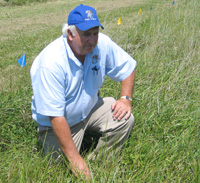Research Collaboration Aims To Reduce Highway Weed Problems
Research Collaboration Aims To Reduce Highway Weed Problems

Published on October 20, 2004
When a landowner implements controls to reduce weed problems on a farm, he or she may be dealing with a few acres, or perhaps even a few thousand acres. But what if a landowner’s weed problems extend for thousands of miles across an entire state?
That’s the challenge that faces Kentucky ’s Transportation Cabinet every year. Weeds that grow along highways can be unsightly, and even pose safety problems for motorists.
A research project under way at the University of Kentucky College of Agriculture aims to help the state’s transportation officials identify the best methods for reducing weed problems in various regions of the commonwealth.
“There’s a lot of difference in vegetation across the state and so this project is devised to identify certain weeds, such as Johnsongrass and Kudzu and Japanese Knotweed, and then develop management techniques for them,” said Bill Witt, plant scientist in UK ’s department of agronomy. “We’re also doing work in native grass establishment along interstate highways, and looking at another group of weeds located under guardrails.”
Funded by a grant from the Transportation Cabinet, the project is the first of its kind. Plots at university research farms in central and western Kentucky, and also along roads in east Kentucky and other areas, provide valuable data on what control products work best for certain weeds.
“We want to put some math behind it, and we want some statistics that will answer questions about what a product can do,” said Mitch Blair, research specialist for the project. “For instance, the question might be does it control Johnsongrass? Yes, it will. But does it control Johnsongrass and also hurt the fescue growing underneath? So it’s a fine balance trying to test the rates and determine how much compound you’re putting out per acre to get the control you want.”
According to Blair , Kentucky has 12 highway districts, and research results will produce information valuable to each district for its own unique weed control situations. Another intended benefit will be cutting costs for the state to maintain highway rights of way.
“There’s a possibility we could reduce mowing and maybe even some of our sprayer applications as time goes along, and we want to integrate both those things into our overall management program to control vegetation,” said David Cornett, branch manager for roadside environmental and vegetation management for the Transportation Cabinet.
Initial results from the project should be in the hands of highway personnel sometime in December. The project is funded through 2005.
- 30 -